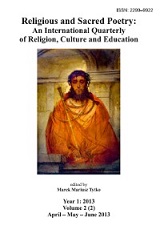Poetics of Love and Devotion in Prešeren’ Poem The Bap-tism on the Savica
Poetics of Love and Devotion in Prešeren’ Poem The Baptism on the Savica
Author(s): Irena Avsenik Nabergoj Subject(s): Language and Literature Studies
Published by: Fundacja Naukowa Katolików »Eschaton«
Keywords: France Prešeren (1800–1849); The Baptism on the Savica; love; metaphors of marvelling lovers; devotion and sacrifice; longing for fulfilment; offering of the will; Dominik Smole (1929–1992); contrary interpretation
Summary/Abstract: This article examines the presentation of love between Bogomila and Črtomir, the main characters in the historic romantic poem Krst pri Savici (The Baptism on the Savica) by France Prešeren (1800–1849). The main protagonists are the pagan leader Črtomir – who enters into battle with an army led by the Christian Valjhun, Duke of Carinthia – and the young maiden Bogomila, Črtomir’s love. The main part of the poem describes Črtomir’s search for Bogomila after the battle, and his baptism at the source of the Savica River, a baptism he accepts out of love for her. At the heart of Prešeren’s poem are the lyrical dialogues about the emerg-ing love between Črtomir and Bogomila that grew into an experience of love marked by immortality, as they renounce their will in exchange for eternal love beyond earthly existence. Bogomila is described as beautiful, innocent, modest, ethereal and gentle by nature, but at the same time steadfast and consistent in her decisions. The main point of the article is Bogomila’s opting for sacrifice, understood in the context of the religious sphere of offering or dedication, of giving up the self to God. Among Slovenian literary critics, Prešeren’s poem is seen as an open work, be-cause it allows each reader to unlock the text in her or his own manner. The most radical and contrary explanation of Prešeren’s poem is Dominik Smole’s more contemporary Slovenian play The Baptism on the Savica. According to Smole, Črtomir and Bogomila do not know how to love; their love is “wild,” depersonalized, violent, devoid of pure desire and too weak for self-sacrifice; they deny and ultimately destroy each other through egotistical behaviour.
Journal: Religious and Sacred Poetry: An International Quarterly of Religion, Culture and Education
- Issue Year: 2013
- Issue No: 2
- Page Range: 67-84
- Page Count: 18
- Language: English

